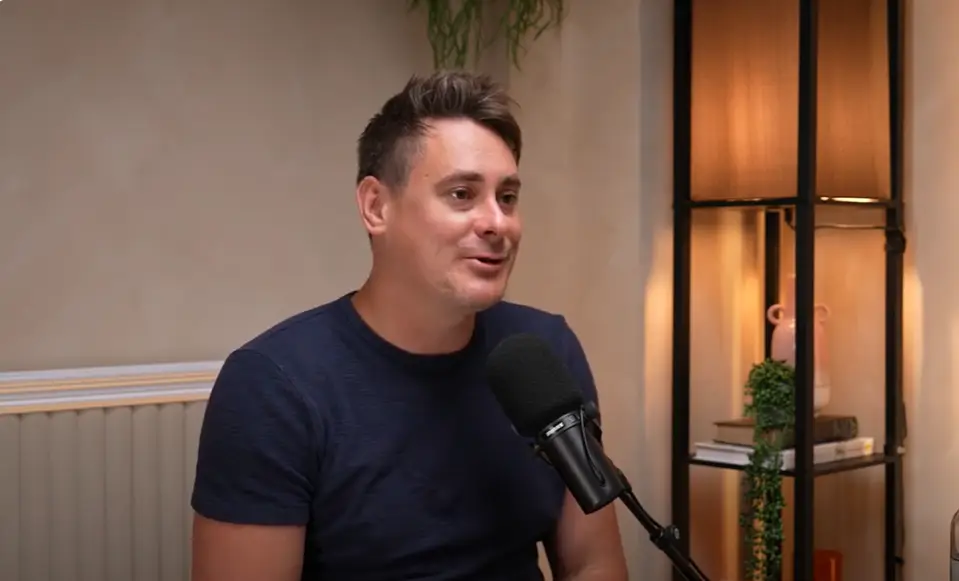
Venture Voices | Praetura Ventures
31 Oct, 202410 minutes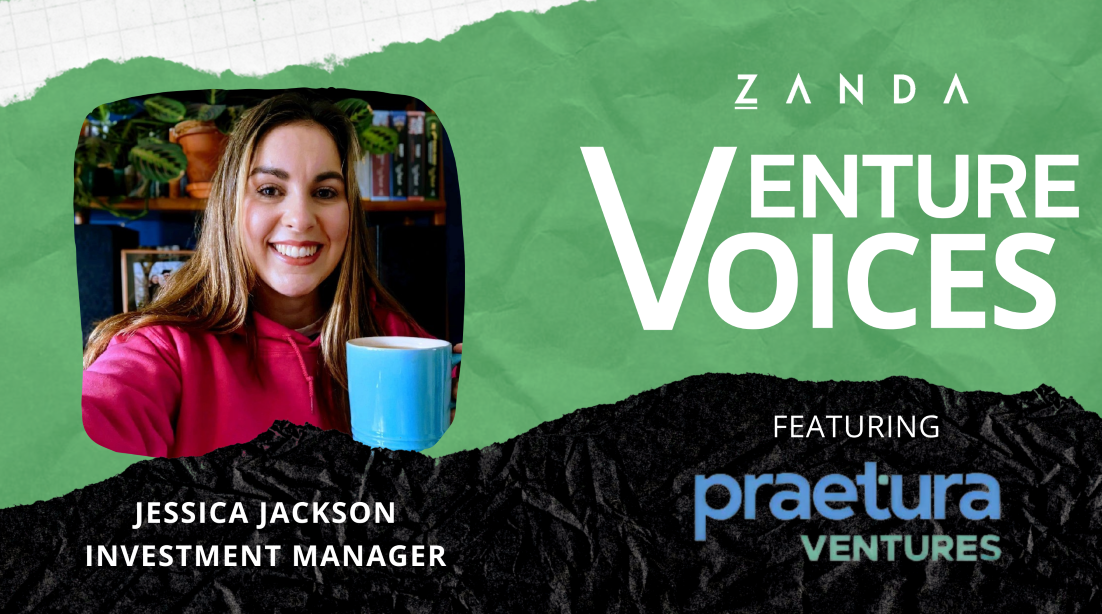
For our third episode of Venture Voices we are joined by Jessica Jackson, Investment Manager at Praetura Ventures.
Praetura Ventures is a venture capital firm based in Manchester, that focuses on backing businesses in the North. Founded in 2011, Praetura's founders saw that there were many early-stage businesses in the North of England that were struggling to get funding and had to look to London for investment opportunities, due to there being a big gap in local support. To address this Praetura Ventures initially raised capital deal by deal from high net worth individuals.
In 2019 Praetura Ventures launched their first EIS (Enterprise Investment Scheme) fund, which was a big milestone in their growth journey. Today their assets under management (AUM) on the equity side are £310m. They manage two public funds: the NPIF II – Praetura Equity Finance, which is part of the Northern Powerhouse Investment Fund II, and the GMC Life Sciences Fund By Praetura. In addition, this year saw the launch of a new VCT (Venture Capital Trust) to accompany Praetura's EIS fund. As a result, Praetura Ventures now offer a range of capital solutions for businesses at different stages and across different sectors in the North to access the resources they need to grow and thrive locally.
Jess, what sparked your eagerness to move into venture capital after working in-house. What made you want to start supporting early stage businesses up north?
My journey into venture capital was a bit unusual. Unlike many in this space who come from a Big Four or accountancy background before moving into private equity, I started on the entrepreneurial side working with founders. My first role was with a company that sold to EMIS Group for £56m. The CEO of that business, then known as Ascribe (now EMIS Health), had grown the business primarily through acquisitions so I started my career seeing the “end game” for a business.
This experience made me interested in working with entrepreneurs and understanding their journey. I didn’t initially see a career in venture capital but found myself in a role with the Growth Company managing GC Angels, a public fund supporting early stage founders and co-investing with angel investors. That role allowed me to build relationships with entrepreneurs, support them beyond just funding and share in their excitement and ambition. I’ve been with Praetura Ventures for two years now and it’s been amazing to continue supporting early stage businesses in the North to access the funding and support they need to grow.
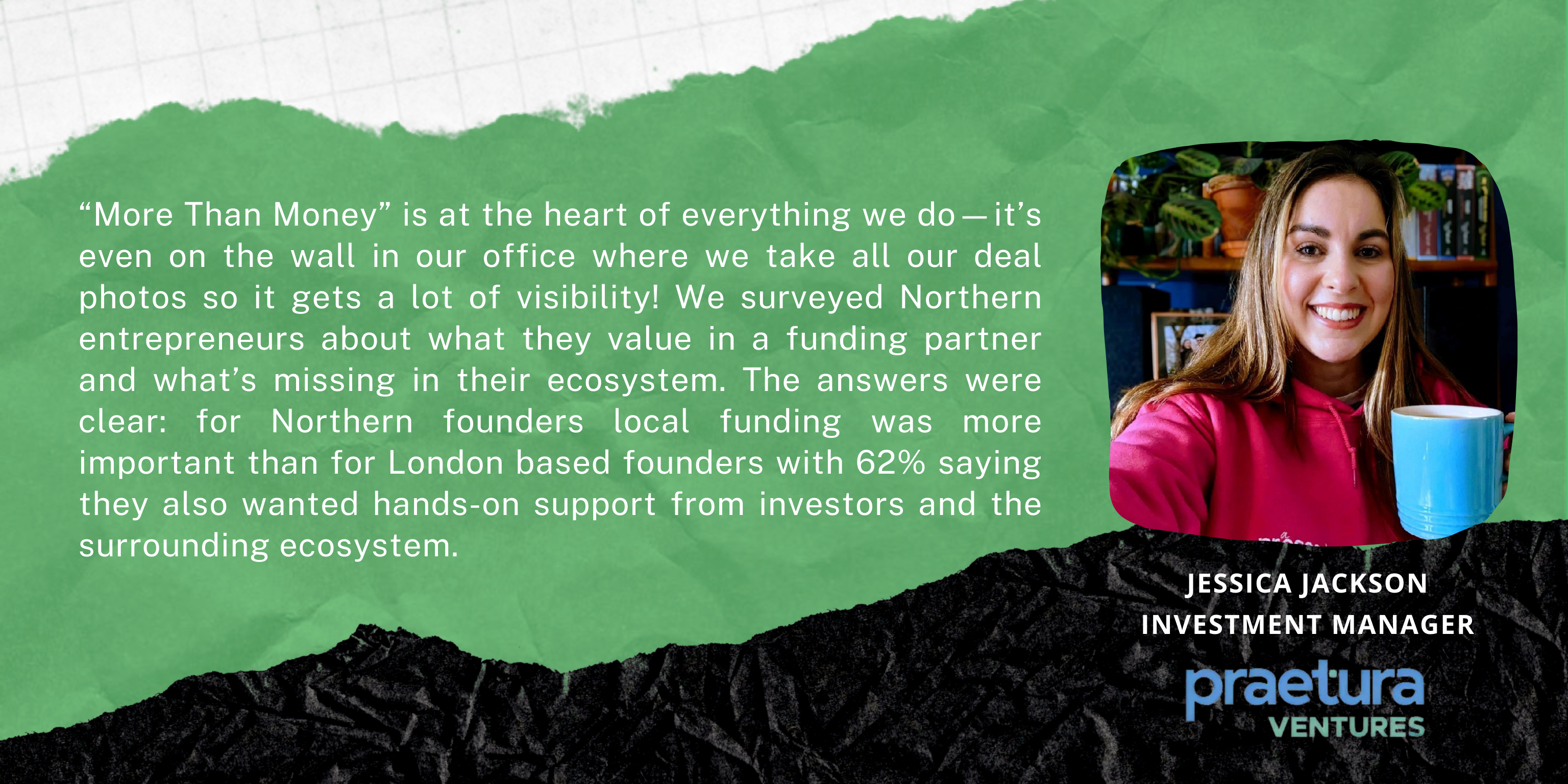
How do you provide operational support to portfolio companies at Praetura Ventures, beyond just financial investment?
“More Than Money” is at the heart of everything we do—it’s even on the wall in our office where we take all our deal photos so it gets a lot of visibility! This principle is key to us because we’ve always known the importance of supporting entrepreneurs beyond capital but our 2022 research, published in a report titled “What’s Powering the Powerhouse?”, reinforced it. We surveyed Northern entrepreneurs about what they value in a funding partner and what’s missing in their ecosystem. The answers were clear: for Northern founders local funding was more important than for London based founders with 62% saying they also wanted hands on support from investors and the surrounding ecosystem.
This fed into the development of our operational partner model which gives founders access to experienced industry leaders who’ve built, scaled and exited successful businesses. These high calibre professionals work with our investment team, participate in diligence, sit on investment committees and join boards. Importantly they aren’t limited to one company; founders can tap into the specific expertise they need whether it’s commercial, legal or people related support.
For us this broad network means founders get bespoke guidance through each stage of scaling as no one person can have all the answers. We want to provide the right support at every stage of a business’s journey.
How has your focus on Northern England shaped your investment strategy? And what advantages do you see for Southern VCs interested in investing in the Northern startup ecosystem?
I’m going to make some broad brush statements here but generally speaking I’d say there’s less competition for deals up here than down south although that gap has narrowed in recent years. Many firms outside the North will say they want to invest in more diverse regions but often don’t have a local presence. And truly understanding Northern cities and their ways of operating—whether it’s Manchester, Liverpool, Leeds or others—requires having “boots on the ground.”
It’s amazing how many great under-the-radar companies are here, growing quietly without much visibility. Some founders are deeply involved in the business not seeking the spotlight and suddenly you discover they’re generating £3m in revenue, it’s incredible. In more rural areas like Lancashire and Cumbria we often see founders who are less familiar with equity finance and may lean towards debt, which presents an opportunity to educate and support them in exploring alternatives. To really connect with and support these companies you need to be here, understanding the local dynamics and adapting to them.
Are there any emerging trends in the Northern startup ecosystem that excite you?
What’s really exciting is seeing the ecosystem mature over time. In less mature markets early support often comes from corporate or bank-led accelerators or generic business programmes, helping founders with pitch decks and introducing them to equity. But now we’re seeing much more specialist support layered on top of that foundational guidance.
For example Manchester has hubs like Manchester Digital, the Turing Innovation Catalyst for AI, DiSH for cybersecurity, Daresbury Sci-Tech for advanced computing and Alderley Park for life sciences, to name but a few. These tech startup clusters are driving innovation in specific sectors and are often tied to specialist sites or corporate initiatives that genuinely want to incubate ideas. It’s great to see this kind of targeted support as it really accelerates the ecosystem’s overall maturity.
Corporate venture arms are also moving in - ZEBOX, The venture arm of a French shipping conglomerate, recently opened in Manchester and is working on net-zero packaging solutions, amongst other things. We’re seeing funds spin out of these initiatives and accelerators, too. This is a big signal to angel groups and VCs thinking of having a Northern presence—there’s a lot of innovation here and it’s worth investing in.
I could fill my diary every day with showcase events, pitch days, Dragons’ Den style competitions and opportunities to provide feedback to hundreds of startups doing amazing things. It’s a great time to be part of this ecosystem!
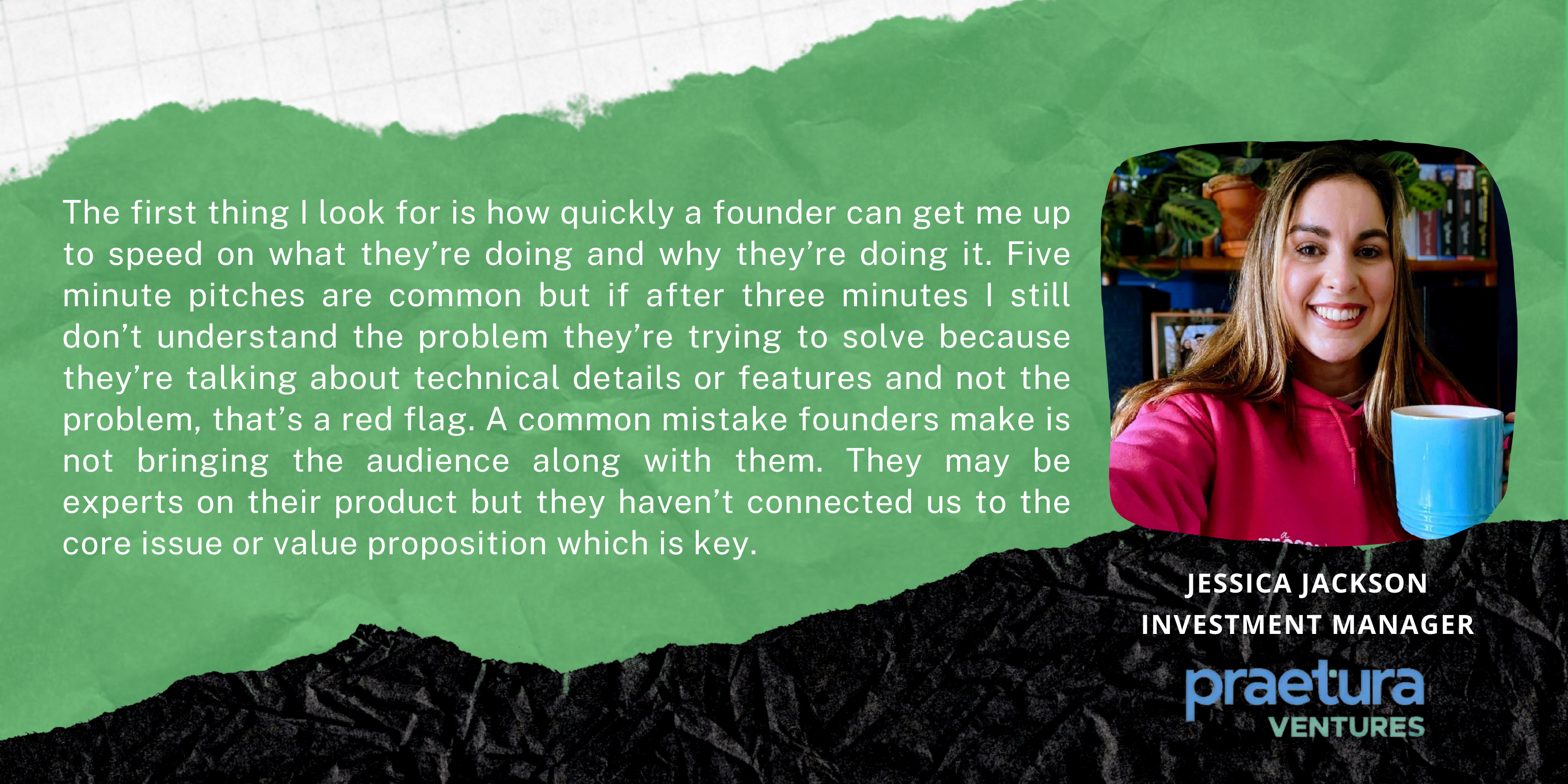
What do you look for in founders and leadership teams when it comes to these kinds of investments?
When I’m sitting down—whether at my desk or on a panel—the first thing I look for is how quickly a founder can get me up to speed on what they’re doing and why they’re doing it. Five minute pitches are common but if after three minutes I still don’t understand the problem they’re trying to solve because they’re talking about technical details or features and not the problem, that’s a red flag. A common mistake founders make is not bringing the audience along with them. They may be experts on their product but they haven’t connected us to the core issue or value proposition which is key.
This lack of clarity raises questions: Can they communicate—not just with investors but with customers? Are they in touch with their customers’ needs or are they building something that might not solve a real problem? This often reveals whether their product even in Minimum Viable Product is customer centric or just an idea they hope will stick.
Adaptability is another big factor I look for. How founders respond to feedback tells a lot—are they receptive, reflective or defensive? Being open to constructive feedback is key not just to the investment relationship but to their own growth as leaders. We’re not expecting complete agreement with everything we say; in fact, constructive pushback is a great opportunity for founders to clarify and strengthen their position. But combative or inflexible responses can indicate problems down the line, especially in a boardroom environment where adaptability is critical.
These initial conversations give a surprising insight into a founder’s ability to lead, adapt and communicate—traits that ultimately determine their success.
Adaptability is key in these fast changing environments. Can you think of any times where you gave some constructive feedback to founders and they came back 6/12 months later and had taken everything on board?
Yes, that happens a lot. We have meetings with businesses where we say "this looks interesting but it’s too early for us" or we’ll have specific concerns about certain aspects of their approach. The best founders respond constructively—they see it as an opportunity to engage, address our concerns and keep the relationship going.
A good example is a life sciences company we invested in recently called LightOx. When they first approached us we were interested in the therapeutic area they were working in but it’s a high risk area and we had some concerns whether our investment committee would be comfortable with it. We were upfront about those reservations and the founder Carrie was great. She offered to come down from the North East, and spent a few hours with us going over the science in detail and answering our questions. That openness and willingness to invest her time gave us a lot more comfort and ultimately we decided to do the deal.
Good founders understand the importance of relationship building in this process. They stay engaged, follow up and even push a bit if needed. Often they come back several months later to show progress or demonstrate how they’ve implemented previous feedback—whether it’s changes to the product, changes to their go to market strategy or evidence of traction. It’s impressive when a founder says "we took your feedback, made these changes and here’s the results". Even if they stick to their original plan they’ll provide data or results to back it up and show us they’re listening to the feedback while also confident in their vision.
It’s a process and sometimes it takes multiple touchpoints before the timing is right. But that’s the name of the game—persistent, proactive founders who keep the conversation going get the farthest.
Have you seen an increase in founders moving to the North for the advantages it offers?
We are definitely seeing this trend, especially with our life sciences fund (the GMC Life Sciences Fund By Praetura), which has a geographical focus on Greater Manchester, East Cheshire and Warrington. The limited partners (LPs) for that fund include the GMCA, Bruntwood SciTech and Enterprise Cheshire and Warrington. One question we always ask the companies applying for our life sciences fund is, do they understand the geographical remit of our fund and what their growth strategy is for the region. It’s not just about plonking someone in a WeWork; we want to know how they plan to grow and engage with the local ecosystem – not just this year but in the years to come.
For example we have a portfolio company ScubaTx which originated from a university spin-out in the North East. They’ve been making headlines for developing a device that extends the viability window of donor organs during transport, which is truly groundbreaking. Their CEO and CFO were based outside of the North East, and so it made sense for them to base themselves in Manchester where they could readily travel, build a local team, and partner with nearby NHS Trusts. Their success shows the importance of having a clear strategy that benefits the North and we make this clear to all the companies we talk to. We’re not looking for companies to tell us what we want to hear; we really want to know their vision and what’s in it for the region.
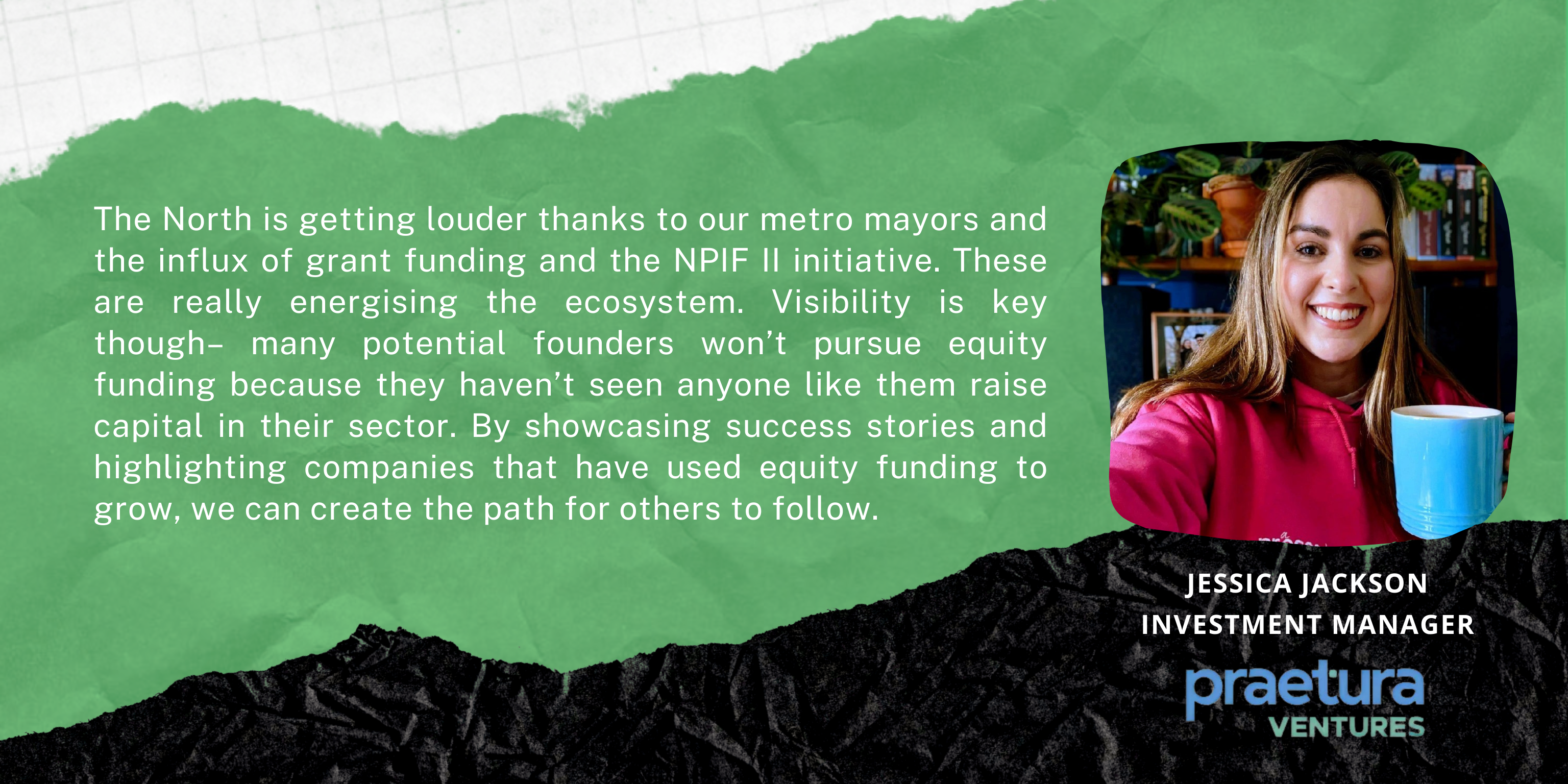
How do you see the VC ecosystem in the North evolving over the next five to ten years especially around tech startups and innovation?
For those who don’t know, the Northern Powerhouse Investment Fund II (NPIF II) has a total allocation of £660m for the entire North with our bid securing £100m for the northwest. This is a big fund and I hope to see more VCs setting up in the region or opening regional offices because we have some exciting clusters emerging, especially in digital deep tech and energy. There’s a lot of innovation happening and I think it’s only going to get more prominent.
The North is getting louder thanks to our metro mayors and the influx of grant funding and the NPIF II initiative. These are really energising the ecosystem. Looking five to ten years ahead as this fund reaches full deployment and maturity I expect to see a lot more companies that have received investment and are growing, expanding and even internationalising.
Visibility is key – many potential founders won’t pursue equity funding because they haven’t seen anyone like them raise capital in their sector whether it’s hospitality or another. By showcasing success stories and highlighting companies that have used equity funding to grow we can create the path for others to follow.
I hope in five years we’ll be gearing up to launch NPIF III and the fund size will need to increase to accommodate the growing number of eligible SMEs. This will also reflect the maturity of the ecosystem as a whole.
Tell us about the reasoning behind PraeSeed, the first preseed cohort-based investment programme in the north of England, that you launched earlier this year.
Yes so, to be clear our criteria for PraeSeed is broad – any sector in the North can apply, with revenue from zero to early stage. This includes companies that may not be ready for a larger seed round but have commercial pilots or initial revenue. I personally find preseed the most exciting space and as part of our NPIF II initiative we recognised the need to support early stage companies because VCs can’t operate at scale in this sector due to the costs and lower fee generation.
Given the number of companies at preseed stage we knew we had to have a strategy that services this segment and energises the ecosystem. I’ve said this before because it’s key. We wanted to create a small supportive community where companies could build micro networks and get direct relationships with peers who are at similar stages – some a bit ahead, some a bit behind.
We launched our cohort programme soon after we announced NPIF II in April this year. Applications opened in late April or early May and we were inundated with applications. We expected a lot, but were blown away by the volume and creativity of the applications.
The diversity of applications was amazing – everything from water tech and robotics to edtech and AI driven tools for creative learning. We even had an application from a coffee roastery! It was great to see so many businesses from all over the North and we were chuffed to find we ended up with 12 companies in our cohort instead of the planned 10 – a testament to the strength of our early stage ecosystem.
Interestingly about 25% of the founders in our cohort are women and over 50% come from diverse backgrounds. We didn’t have to do anything to achieve these diversity metrics, it just happened organically. We’re really excited about the future and proud of the community we’re building!
The programme ran for six weeks and focused on due diligence. We coached them through various areas and culminated in an exercise that was our diligence process. In the final week we provided access to a pitching coach for a morning session which was really useful although it wasn’t the main objective.
The event was all about showcasing the companies and they did a great job of doing so. We generated a lot of interest from investors as a result which is exactly what we wanted to do – bring in additional funding alongside our own investments.
How do you foster that culture of collaboration amongst the entrepreneurs, not just on pre-seed but across the portfolio as well?
Throughout the programme we told the founders we wanted to invest in as many of them as possible but it was up to the founders to engage, show up each week and build a relationship with us. This allowed us to get to know their businesses better so we could present the best case to our investment committee.
I had some initial concerns about the founders being competitive with each other but that turned out to be unfounded. It was great to see them supporting each other. Each founder brought different strengths to the table – some were great at articulating their company’s voice, others were more comfortable with commercial or financial aspects. It was lovely to see them coaching each other, sharing experiences and discussing methods and tools that worked for them.
We created a WhatsApp group for the cohort which became a space for sharing tips, resources and celebrating each other’s successes. This sense of community was fantastic and a testament to the quality of people we selected for the programme. We felt good vibes from everyone during the interview process.
At Praetura we’ve also been growing our portfolio to around 45 companies and we recently held a portfolio festival. Our usual Christmas drinks event was getting too small with our growing number of companies! The festival allowed our operational partners to give talks on various topics like selling into the public sector and it was a great opportunity for everyone to share insights and learnings. Many of the companies are in adjacent spaces and it’s common for them to know each other or be customers of each other.
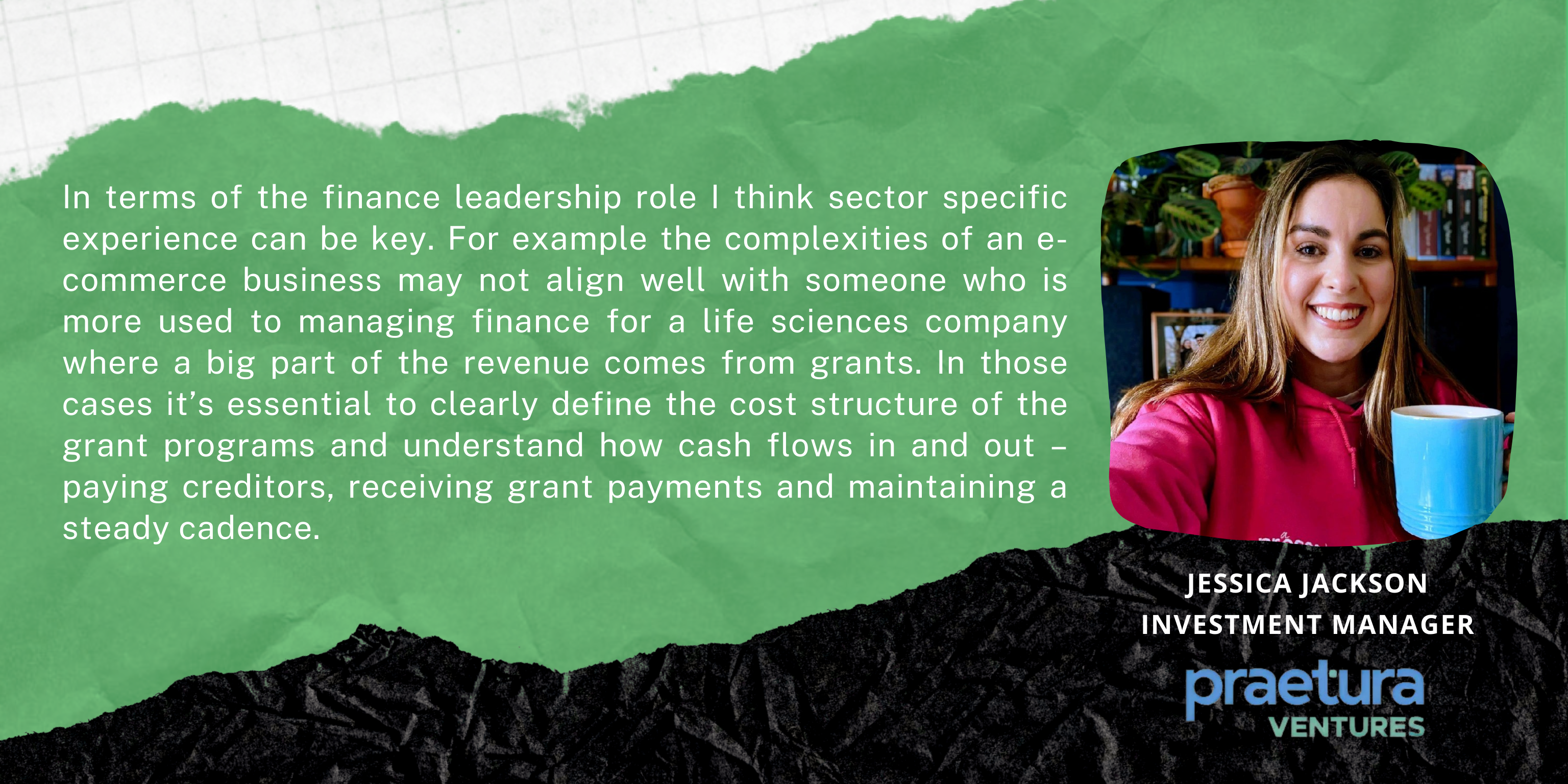
As businesses grow and begin to seek investment from you, how do you view the importance of a finance leader’s role within the organisation?
In our investments, especially in early stage companies, it’s common for founders to have limited financial support. Some may have basic bookkeeping, others utilise fractional CFOs but this is less common. Having good management information is key, especially when you’re a board member trying to assess runway, decide whether to burn cash or whether you need to raise earlier.
A finance leader can also play a big part in the fundraising process. They may have a useful network and can take some of the burden off the CEO during the fundraising. It will depend on the stage and resources of the business but the company must have the right financial expertise – whether interim or full time. Ultimately you need to guide businesses to bring in the right resources in a cost effective way that suits their needs and stage of growth.
So that kind of founder finance leader relationship is key to success. Any examples in the portfolio where you see that working well at the moment?
I would highlight ScubaTx and their leadership team, especially the CEO and CFO who had been involved with the company for a long time in advisory roles before taking on full time executive positions. Their insights and the quality of their information was great.
When they approached us they had a grant but had a tight deadline, needed an investment commitment by March 31st and it was already early to mid-March. We liked the business and decided to move fast. We managed to get an investment committee document out in 2.5 weeks and do all the due diligence in that time which is pretty unusual.
We were able to move so fast because of the quality of information provided by the ScubaTx team. If we had encountered a situation where the financials were missing or the information was poor we wouldn’t have been able to move so fast or be so confident.
For a first time founder, how important is it to have someone that’s got that previous startup or scale up experience or someone with sector specific knowledge?
In terms of the finance leadership role I think sector specific experience can be key. For example the complexities of an e-commerce business may not align well with someone who is more used to managing finance for a life sciences company where a big part of the revenue comes from grants. In those cases it’s essential to clearly define the cost structure of the grant programs and understand how cash flows in and out – paying creditors, receiving grant payments and maintaining a steady cadence.
At the very early stages founders struggle with financial management and I see this all the time. It was particularly evident in our pre-seed cohort so we designed a dedicated module that ran throughout the six week program. Sophie Conaghan from Finance for Founders led this module and some founders were lost at the start, unsure how to structure their models. But they took the concepts home, applied them and came back with a better understanding. We weren’t trying to turn them into finance directors which is unrealistic at that stage but to give them a basic toolkit to understand how financial models work. So they could build a simple model to support a pre-seed round without needing a fully integrated five year forecast, which would be speculative. More importantly they could engage with finance professionals and articulate their needs.
You won 2021 North West Emerging Dealmaker of the Year, do you have any personal professional goals you’re aiming for in the next few years?
Good question. I think it would be really cool to see, prior to the next PraeSeed cohort, a couple of follow ons, so that we can say to future cohorts this is what we set out to do, this is what we have done and will continue to do. I want to see the PraeSeed program really hit its stride and reap the rewards of what we were expecting to achieve. I’m really enjoying being at Praetura and we’ve got huge goals to invest in all of the regions. There’s so many exciting things going on in those other regions and we really want to find the gems there. So that’s kind of a big goal.
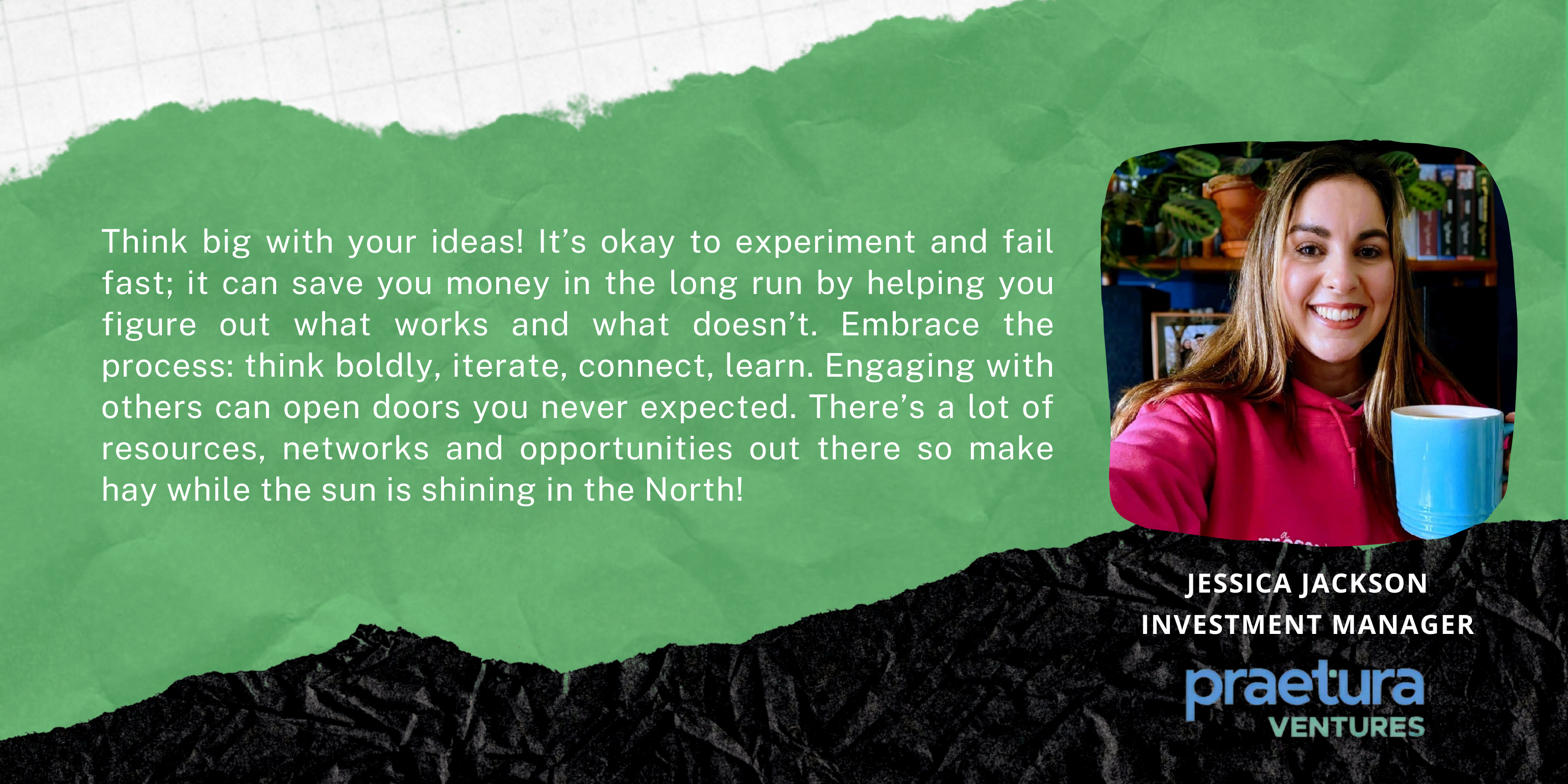
Finally, what’s a piece of advice you’d share with founders aspiring to work with you guys to help their next phase of growth?
Get in touch and say hi, don’t be shy to share what you do and let us know if you’re specifically thinking of applying for pre-seed funding. Think big with your ideas! It’s okay to experiment and fail fast; it can save you money in the long run by helping you figure out what works and what doesn’t. Embrace the process: think boldly, iterate, connect, learn. Engaging with others can open doors you never expected. There’s a lot of resources, networks and opportunities out there so make hay while the sun is shining in the North!


